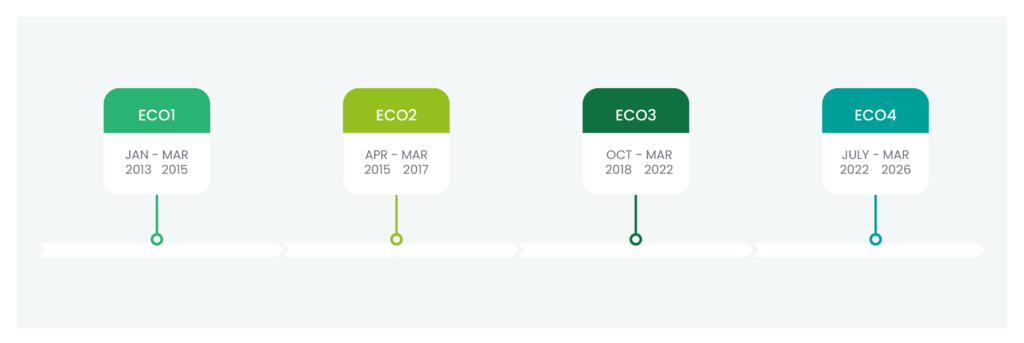EPC Ratings: What Are They & How to Improve Them?
Contents
What is an EPC?
An Energy Performance Certificate (EPC) Rating is an easy, at a glance way to recognise what your home’s energy performance is like.
There is ever-increasing talk these days about emissions, net zero targets, and improving energy efficiency. The way that our homes are heated, powered, and retain their energy are all contributing factors to their energy efficiency and performance. The worse our homes use energy, the more energy they need to keep warm – leading to rising energy bills, and higher emissions to create that energy.
Your EPC is a measure indication of how energy efficient your home is. It is measured on ascale of A-G, with A being the best and G being the worst performing. One of the great things about the EPC is that there is a standardised process for calculating them, and they can only be given by a qualified assessor so you can always be assured that you will get an accurate rating
How are EPC ratings calculated?
Your EPC rating is calculated based on how much energy your property uses (for heating, lighting, etc.), and how much energy it loses (through poor insulation for example) per square metre.
The assessor will calculate the property’s Standard Assessment Procedure (SAP) score, and from there will use that number to determine the property’s EPC rating. The higher your home’s SAP score, the higher your EPC rating will be.
In order to calculate your SAP score the assessor will have a list they must check of everyway that your property uses and lose energy. This includes things like how well yourproperty is insulated, what energy source you have (gas, electric, oil etc.), whether there areany renewable technologies installed in your home, and even what kind of shower you have.Each of these things is given a score, and that score is then use to determine your EPC.Generally, your SAP score will be between 1-100, and this will correspond with the rating foryour EPC.
Why is an EPC Important?

Are you eligible for an ECO4 grant?
Will it Improve My Energy Bills?
Now we’ve talked about what EPC ratings are, and how they’re important we can tell you a little more about how they affect you. Sometimes it can be easy to look at something like an EPC rating and not really consider how it translates into your everyday life, we do it all the time – do we really consider the energy efficiency of our brand-new TV when we get it on black Friday? Or do we just peel the sticker off that tells us when we get home and not think about it again?
In practical terms an EPC has a much more direct impact on your home than that. The higher your EPC rating, the better your home uses energy. That means the better your energy bills are going to be. It only makes sense that the less energy your home wastes then the less it’s going to need to keep it running and warm right? The less energy your home needs, the less you need to spend on gas and electricity, or another type of more expensive fuel if you’re off grid.
One of the key things about how the EPC is assessed and scored that we mentioned in passing earlier is that your EPC will give you a list of potential places you can improve your rating. You aren’t simply given a rating and condemned to be stuck with it forever, you are given helpful, useful advice on what can be improved in your home to make it more energyefficient. Therefore, reducing your energy usage, and energy bills.
How Can I Improve My EPC?
Because an EPC rating is determined by lots of different factors relating to your home’senergy efficiency, there are a number of different ways to improve it.
These measures to improve your EPC range from small changes to bigger under takings, but all of them make a difference. For example, one of the easiest things you can do to improve your EPC is switch your lightbulbs to LED lightbulbs. LED bulbs can look like they’re significantly more expensive than a regular bulb, but they last so much longer than the traditional alternative that they’re more like an affordable investment into your home.
LED bulbs can last for 60,000 hours of lighting, and could cost between £15-£20 depending on the type you buy. A more traditional bulb on the other hand might only cost less than £5, but they tend to only last around 1,200 hours on average. If energy companies do not hit their targets for the ECO scheme, they will be penalised and the money from this penalty, in turn, will be used to fund other energy efficiency schemes.
If you bought 10 bulbs that last 1,200 hours for £2 each, you’d be looking at 12,000 hours of light for £20 – instead of the 60,000 hours you would get from an LED that cost the same. Not to mention, the cost of running an LED bulb can be easily less than half of the cost of running a traditional bulb for the same amount of time, so you are making significant savings on your energy bills and performance in the running the bulbs too!
Replacing your bulbs is a small way to improve your EPC rating. There are other ways too. Installing a smart meter so you have accurate and real time energy meter readings is actually a good way to improve your EPC – it won’t get you any more points in itself, but seeing where your energy goes, and when is a great way to get a handle on what improvements you could make.
Other ways to improve your EPC include things like; replacing your windows and doors to better insulated, modern double or triple glazed options; upgrading your boiler to a more energy efficient option or even to a highly efficient Air Source Heat Pump; even going so far as to invest in a solar panel and battery system – which would be a massive boost to your home’s EPC rating.
Are you eligible for an ECO4 grant?
Guides & Advice
ECO4 is a great scheme, but being so new it can be a little confusing. We’ve put together some guides to go into more detail about all aspects of ECO4 and help arm you with as much knowledge as possible.
The complete guide to ECO4
EPC Ratings: What Are They & How to Improve Them?
ECO4: What is it and how is it helping us?
What Does The ECO4 Scheme Mean For Me?
What Can ECO4 Do for My Home?
ECO4 Case Study – James & Olivia
Have You Heard of ECO4?
The History of ECO4
Are you eligible for an ECO4 grant?

© HonestQuotes 2023 – All Rights Reserved
